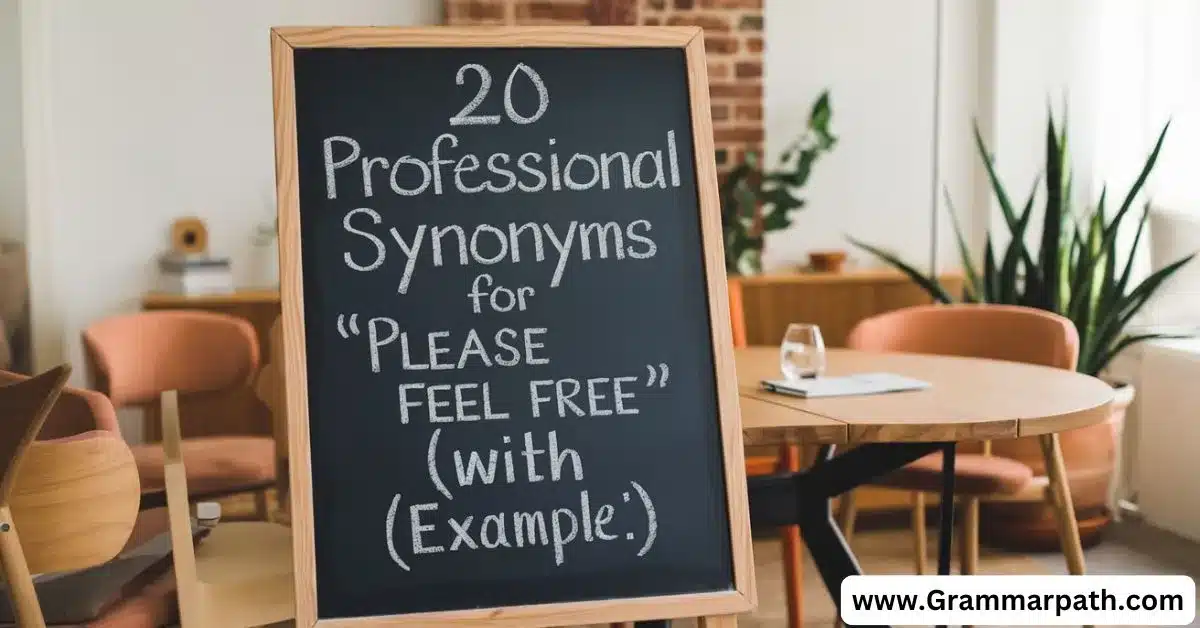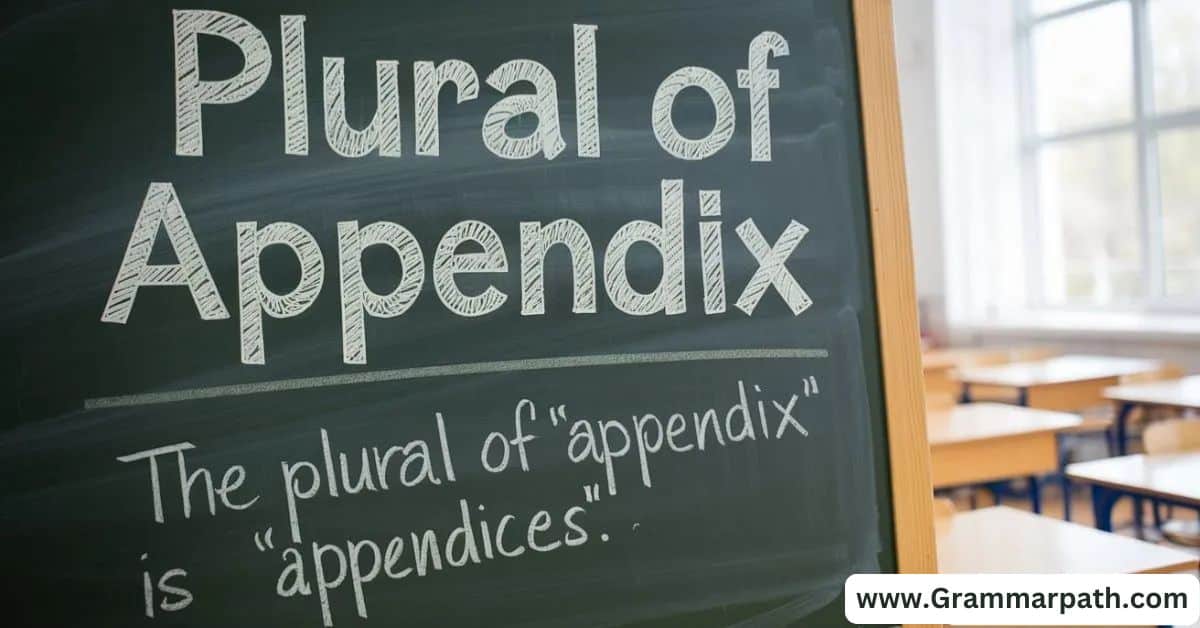
20 Professional Synonyms for “Please Feel Free” (With Example)
In today’s fast-paced world of professional communication, choosing the right tone in your messages is essential. One of the most common expressions especially in emails is the phrase “please feel free”. We use it to encourage others to ask questions, share thoughts, or take a specific action. However, overuse of this phrase can come across as overly casual or repetitive, particularly in formal communication. That’s where professional synonyms come in handy. By using alternatives, you can add variety to your language and present a polished, confident tone that enhances your message.
Whether you’re writing to clients, colleagues, or new contacts, you’ll want to select words that convey warmth while still sounding professional. Using alternatives for “please feel free” also helps you adapt your tone based on the context, ensuring that you’re neither too casual nor too distant.
In this article, we’ll explore 20 sophisticated ways to say “please feel free” that maintain courtesy and encourage engagement. Each synonym is accompanied by examples to illustrate how to use it effectively in emails or other professional scenarios.
Is It Professional to Say “Please Feel Free”?
While “please feel free” is polite and widely accepted, it may sometimes lack the confidence or precision needed in professional settings. In business communication, choosing alternatives can sound more assertive and refined, showing attentiveness to tone and context.
Words like “do not hesitate” or “you’re encouraged to” offer the same openness with a stronger professional edge, making your message both welcoming and polished.
What to Say Instead of “Please Feel Free”
- Do not hesitate to
- Feel welcome to
- You’re encouraged to
- I invite you to
- We welcome you to
- It would be our pleasure if you
- Consider this your invitation to
- I urge you to
- Please be advised to
- Kindly
- You are more than welcome to
- We would be delighted if you
- Should you wish to
- If you require any assistance
- We are here to assist you
- You’re more than invited to
- It would be my pleasure to help
- You are always welcome to
- Please let me know if there’s anything else I can do
- Reach out whenever convenient for you
20 Other Ways to Say “Please Feel Free”
Here are 20 Other Ways to Say “Please Feel Free” (With Example):
1. Do not hesitate to

When encouraging someone to reach out or share information, “Do not hesitate to” offers a confident and direct tone. It’s perfect for formal business emails, as it clearly signals to the reader that they’re welcome to connect without sounding too casual.
Example:
“Do not hesitate to contact me if you have any questions about the project timeline.”
2. Feel welcome to
“Feel welcome to” is a warm alternative that implies openness and approachability. This phrase works well in scenarios where you want to create a relaxed atmosphere while staying professional.
Example:
“Feel welcome to join the meeting if you’d like to contribute ideas or listen in.”
3. You’re encouraged to
“You’re encouraged to” is perfect for a formal setting where you want to actively invite someone’s input or participation. This phrase emphasizes that their contributions are valued.
Example:
“You’re encouraged to provide feedback on the new policy draft before next week’s meeting.”
4. I invite you to
For messages where you want to sound welcoming yet refined, “I invite you to” is an ideal choice. It sounds courteous and formal, making it suitable for reaching out to clients or partners.
Example:
“I invite you to share any thoughts you may have on the proposal.”
5. We welcome you to
“We welcome you to” is especially effective when speaking on behalf of a team or organization. It conveys an inclusive and collaborative approach, fitting for both internal and external communications.
Example:
“We welcome you to join the event and share your experiences with the group.”
6. It would be our pleasure if you

Adding an extra layer of politeness, “It would be our pleasure if you” sounds refined and respectful. This phrase is well-suited for formal invitations or client communication.
Example:
“It would be our pleasure if you could review the attached document and offer your insights.”
7. Consider this your invitation to
“Consider this your invitation to” is both direct and encouraging, signaling to the recipient that they are welcome to take action. It’s particularly useful for encouraging people to attend events or engage with new initiatives.
Example:
“Consider this your invitation to attend our upcoming webinar on digital marketing trends.”
8. I urge you to
If you want to encourage someone to act quickly or with a sense of importance, “I urge you to” is a fitting choice. It conveys urgency while still remaining polite.
Example:
“I urge you to review the contract details at your earliest convenience so we can move forward.”
9. Please be advised to
“Please be advised to” is a more formal phrase that suits instructions or guidance in business settings. It communicates the invitation clearly but maintains a professional tone that is appropriate for technical or advisory contexts.
Example:
“Please be advised to contact our support team for any technical assistance during setup.”
10. Kindly

Simply using “Kindly” as a stand-alone invitation can subtly encourage action without being overly direct. It’s commonly used in professional emails to soften requests.
Example:
“Kindly let me know if there’s anything further you need.”
Pro Tips
The key to using these alternatives effectively lies in understanding the context and adjusting your tone to fit each situation. Use “Do not hesitate to” or “I urge you to” when you need more assertiveness, or “We welcome you to” and “Feel welcome to” for a friendlier tone. Politeness and clarity are essential in professional communication, so choose a phrase that aligns with your intent while still maintaining the right level of formality.
11. You are more than welcome to
This phrase adds a welcoming, friendly touch, which makes it perfect for invitations or encouraging responses. It’s suitable for any professional setting where you want to convey warmth without losing formality.
Example:
“You are more than welcome to reach out if there’s anything you’d like clarified regarding the report.”
12. We would be delighted if you
When expressing enthusiasm for someone’s involvement, “We would be delighted if you” works well. It’s a professional way to convey excitement while inviting their participation or response.
Example:
“We would be delighted if you could join our upcoming training session.”
13. Should you wish to
This formal phrase works well in emails where you want to offer the recipient an option without pushing them. It’s polite and professional, fitting for business letters and emails alike.
Example:
“Should you wish to discuss this matter further, please don’t hesitate to contact me.”
14. If you require any assistance
In contexts where assistance may be needed, “If you require any assistance” sounds professional and helpful. It’s great for client services or support-focused communication.
Example:
“If you require any assistance with the new software, feel free to reach out to our support team.”
15. We are here to assist you

This option offers assurance that help is available, making it ideal for customer service or support emails. It’s a friendly yet professional invitation for the recipient to reach out.
Example:
“We are here to assist you with any questions you may have during your onboarding process.”
16. You’re more than invited to
Using “You’re more than invited to” adds a sense of welcome and inclusiveness. This phrase is suitable for invitations or when extending an offer to participate in discussions or events.
Example:
“You’re more than invited to join our open Q&A session on Friday if you’re interested.”
17. It would be my pleasure to help
This phrase adds a personal touch, perfect for situations where you want to emphasize a willingness to assist. It works well in one-on-one emails, particularly with clients or colleagues.
Example:
“It would be my pleasure to help with any additional information you might need.”
18. You are always welcome to
This is a polite, open-ended phrase that assures the recipient of your accessibility. It’s well-suited for customer service and general inquiries.
Example:
“You are always welcome to reach out if you have questions about our services.”
19. Please let me know if there’s anything else I can do
This phrase makes the recipient feel valued and supported, especially at the end of a conversation or when concluding a project. It’s ideal for client-focused communication.
Example:
“Please let me know if there’s anything else I can do to ensure the project’s success.”
20. Reach out whenever convenient for you

When offering flexibility, “Reach out whenever convenient for you” adds an accommodating tone. It’s perfect for situations where timing might be an issue, allowing the recipient to connect at their convenience.
Example:
“Reach out whenever convenient for you if you’d like to discuss the proposal further.”
Final Thoughts
Mastering these professional synonyms for “please feel free” will not only enhance your communication skills but also help you build stronger connections with colleagues and clients. With a versatile set of phrases, you’ll be ready to adapt your emails and messages to any scenario, conveying the right level of warmth and professionalism. Polished communication is an asset in the workplace, so practicing these phrases can go a long way in elevating your writing.
By incorporating these feel free synonyms, you’ll be able to personalize your emails and make a lasting impression on every recipient. Each word choice is a small step toward building trust, professionalism, and clarity in your business relationships.

Emily Olivia is an experienced writer specializing in grammar and English language topics. With a passion for clarity and precision, she shares valuable insights on synonyms, grammar rules, and writing tips to help readers enhance their language skills on Grammar Path.





